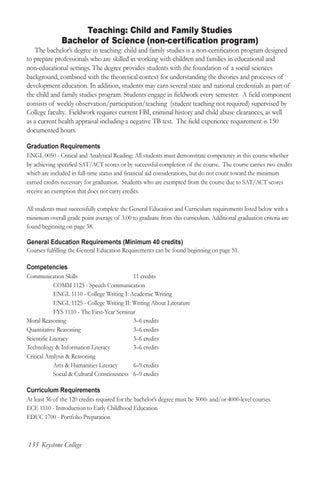Teaching: Child and Family Studies Bachelor of Science (non-certification program)
The bachelor’s degree in teaching: child and family studies is a non-certification program designed to prepare professionals who are skilled in working with children and families in educational and non-educational settings. The degree provides students with the foundation of a social sciences background, combined with the theoretical context for understanding the theories and processes of development education. In addition, students may earn several state and national credentials as part of the child and family studies program. Students engage in fieldwork every semester. A field component consists of weekly observation/participation/teaching (student teaching not required) supervised by College faculty. Fieldwork requires current FBI, criminal history and child abuse clearances, as well as a current health appraisal including a negative TB test. The field experience requirement is 150 documented hours. Graduation Requirements ENGL 0050 - Critical and Analytical Reading: All students must demonstrate competency in this course whether by achieving specified SAT/ACT scores or by successful completion of the course. The course carries two credits which are included in full-time status and financial aid considerations, but do not count toward the minimum earned credits necessary for graduation. Students who are exempted from the course due to SAT/ACT scores receive an exemption that does not carry credits. All students must successfully complete the General Education and Curriculum requirements listed below with a minimum overall grade point average of 3.00 to graduate from this curriculum. Additional graduation criteria are found beginning on page 38. General Education Requirements (Minimum 40 credits) Courses fulfilling the General Education Requirements can be found beginning on page 51. Competencies Communication Skills 11 credits COMM 1125 - Speech Communication ENGL 1110 - College Writing I: Academic Writing ENGL 1125 - College Writing II: Writing About Literature FYS 1110 - The First-Year Seminar Moral Reasoning 3–6 credits Quantitative Reasoning 3–6 credits Scientific Literacy 3–6 credits Technology & Information Literacy 3–6 credits Critical Analysis & Reasoning Arts & Humanities Literacy 6–9 credits Social & Cultural Consciousness 6–9 credits Curriculum Requirements At least 36 of the 120 credits required for the bachelor’s degree must be 3000- and/or 4000-level courses. ECE 1110 - Introduction to Early Childhood Education EDUC 1700 - Portfolio Preparation
133 Keystone College
